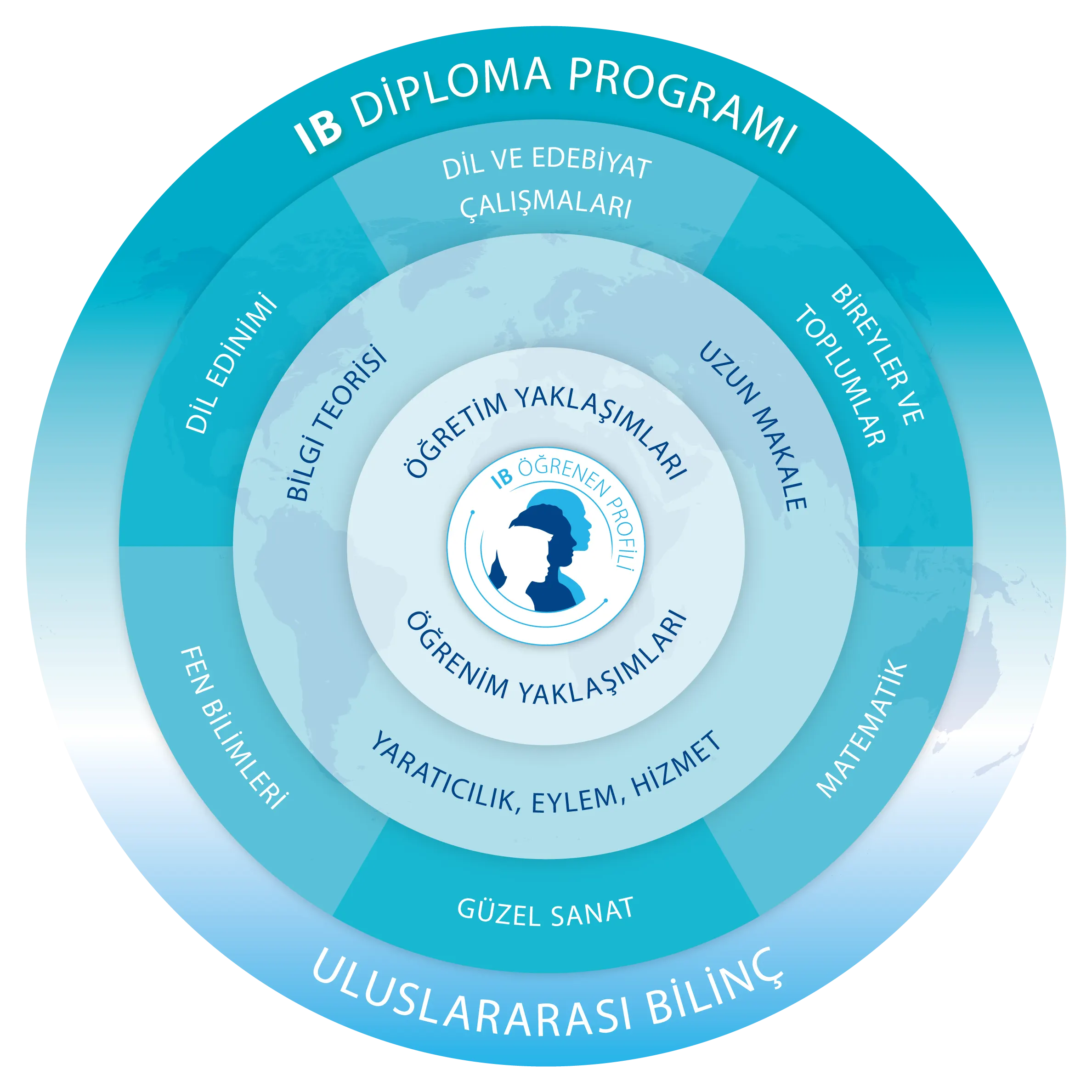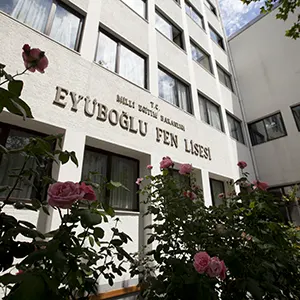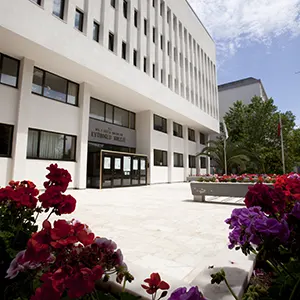
International Baccalaureate Diploma Program (IB DP) at Eyüboğlu
Empowering Tomorrow's Leaders through Academic Excellence
International Baccalaureate Diploma Program prepares students aged 16 to 19 for success in university and their future lives. Aimed at fostering individuals who are "Inquirers, Knowledgeable, Thinkers, Communicators, Principled, Open-minded, Caring, Risk-takers, Balanced, Reflective" like in all IB programs, it is designed not only to provide students with a high-quality education but also to ensure their intellectual, social, emotional, and physical well-being.
The highly prestigious IBDP begins in the 11th grade, with students taking exams evaluated by external IB examiners in the 12th grade. Successful students are eligible to receive the internationally recognized diploma, accepted by leading universities worldwide.
IB Diploma Programme in Numbers
- Implemented in 145 countries and 3020 schools globally.
- Recognized by 1925 universities worldwide.
- Over 1,200,000 graduates from the programme.
- Annual participation of 200,000 students in examinations.
- Approximately 650 students from Turkey take the exams.
- Students from 210 different nationalities participate in the examinations.
Requirements for Implementing IB DP in a School
For a school to implement the IB DP, it must meet the conditions set by the IB organization and be authorized by the IB. These conditions are uniform for all schools and are designed to ensure that schools are ready to successfully implement the program. The IB Diploma Programme is officially recognized by the Turkish Ministry of National Education.
Subject Groups and Objectives in the IB Diploma Programme
The IB Diploma Programme allows students to choose from six different subject groups: language and literature, language acquisition, individuals and societies, sciences, mathematics, and the arts. It is obligatory for students to take courses from each group. These courses are defined as higher level (HL) and standard level (SL) and each student is required to take 3 higer level and 3 standard level courses. Based on their university goals, some students may choose four higher level and two standard level courses.
In addition to courses, all students must complete:
- Theory of Knowledge (TOK)
- Extended Essay (EE)
- Creativity, Activity, Service (CAS) activities
At the end of the program, students take written exams which are evaluated by external IB examiners. Students also engage in internal assessment (IA) activities at school according to program requirements. These assessments are either first evaluated by teachers and then sent to external moderators or directly sent to external examiners. Students who fulfill the program requirements earn the diploma.
Group 1: Language and Literature
IB DP Language and Literature courses develop written and oral expression in the native language and cultivate a critical approach to literature. Students analyze literary works from different genres, periods, and cultures, guiding them in questioning the literary tools that create meaning. In the language and literature course, students learn to approach works in other languages with respect and tolerance, demonstrating universal truths confidently through written or oral interpretations.
Group 2: Language Acquisition
The aim of this course is for students to have bilingual proficiency in international interactions. It covers both literary and contemporary topics for advanced language learners. The program explores goals and meanings in written and oral texts to enhance high-level communication skills.
Group 3: Individuals and Societies
The Individuals and Societies subject group spans various fields from Social Sciences to Humanities. Students learn to critically evaluate evidence, analyze understanding through concepts, and explore the most important theories and ideas in the social sciences. Business and Management, Economics, Geography, History, Information Technology in a Global Society, Philosophy, Psychology, Social and Cultural Anthropology, World Religions (standard level only), Environmental Systems and Societies (also in group 4), and Societies are among the 3rd group courses.
Group 4: Sciences
The IB Sciences program provides students with a solid foundation in theoretical concepts through an experimental approach. Students develop significant research and analysis skills through various activities, including laboratory and fieldwork. They also see connections between different science disciplines and their connections to other fields. Biology, Chemistry, Design Technology, Environmental Systems and Societies, Physics, Computer Science, Sports, Exercise and Health Science (standard level only) are among the group 4 science courses.
Group 5: Mathematics
IB Mathematics supports the use of various techniques and technologies to develop problem-solving and critical thinking skills, emphasizing that mathematics is an international language. Among the 5th group mathematics courses are Mathematics: Analysis and Approaches, Mathematics: Applications and Interpretation.
Group 6: Arts
The goals of the IB Visual Arts are for students to explore the aesthetic features of visual arts, the relationship between form and meaning, the social and cultural functions of visual arts, and critically respond to them. Dance, Film, Music, Theatre, and Visual Arts courses are among the group 6 courses.
In addition to courses, key components of the Diploma Programme that every student is expected to complete include Theory of Knowledge (TOK), the Extended Essay (EE) and Creativity, Activity, Service (CAS).
Theory of Knowledge (TOK)
The Theory of Knowledge course is central to the IB Diploma Programme, aiming to cultivate students as individuals who can produce original yet logical thoughts, analyze diverse ideas, possess critical thinking skills, evaluate evidence, approach learning with a consistent mindset, and value other cultures and perspectives. TOK is a questioning-oriented course that allows students to change their perspectives. During the two-year program, students prepare a Theory of Knowledge exhibition evaluated by teachers and write an essay of 1200-1600 words related to one of the six questions published every September, which is evaluated by external IB examiners.
Extended Essay (EE)
The compulsory Extended Essay is an in-depth research of 3200-4000 words that the student conducts on a chosen and interesting topic. The purpose of the Extended Essay is to allow students to:
- Enhance their knowledge by conducting research in an area of interest,
- Present their ideas and acquired knowledge in a logical and coherent manner,
- Develop skills in writing and presenting a thesis in a proper manner,
- Prepare for research-based thesis writing at university.
Each student has an advisor to guide them through the Extended Essay process, and if plagiarism is detected, the student cannot receive the diploma.
Creativity, Activity, Service (CAS)
CAS (Creativity, Activity, Service) means learning by doing. It offers students the opportunity to develop their personal growth not only academically but also through creativity, physical activity, and community service in an extracurricular environment.
- Creativity: Encompasses a wide range of imaginative and artistic activities beyond the school curriculum. It includes individual creativity in designing and implementing service projects.
- Activity: Covers participation in trips, individual and team sports, and physical activities outside the school curriculum. It also includes physical activities spent on service and creativity projects.
- Service: Represents community service. It includes environmental projects and international projects, involving "doing" work for and with others. Examples of service activities include environmental projects, aid campaigns for sister schools, tree planting projects, assistance to earthquake victims, first aid courses, civil defense, visits to nursing homes and orphanages, voluntary work in museums, teaching needy students, fundraising activities for organizations like UNICEF.
CAS activities best reflect the lifelong learning philosophy of the IB. The CAS program covers an 18-month period, and during this time, students keep a process diary about their experiences and create a CAS portfolio. Completion of CAS activities is required to receive the IB diploma.
Eyüboğlu College IBDP students consistently surpass the world average in their success.
Offering the program to its students since 1996, Eyüboğlu College is one of the first schools authorized to implement the IB Diploma Program in Turkey. The school consistently achieves results above the world averages by successfully implementing the program each year.
Students who earn the IB diploma are accepted by foreign universities and also benefit from scholarships provided by foundation universities in Turkey. IB graduates from Eyüboğlu College have been accepted into prestigious universities such as Harvard, Cambridge, Oxford, McGill, as well as leading universities in Turkey, including Boğaziçi, İTÜ, YTÜ, Koç, Sabancı, and Bilkent.
Benefits of the IB Diploma Programme:
- The IB Diploma Programme prepares students for university entrance exams by supporting a learning approach based on critical thinking and inquiry rather than rote memorization.
- Graduates of the IB Diploma Programme have a higher percentage of graduating from university compared to other high school graduates, according to research.
- The IB Diploma is recognized worldwide, providing priority acceptance in universities in all countries.
- Depending on the diploma score, the IB Diploma increases the chance of receiving scholarships from foreign universities.
- The IB Diploma allows students to be exempt from certain courses or count some IB DP courses as credits, enabling them to complete the university program in a shorter time.
- The IB Diploma increases the chance of receiving scholarships or the opportunity to transition to other departments within the university program at foundation universities in Turkey.
REFERENCES
Diploma Programme at a Glance. http://www.ibo.org/diploma Logos-The International Baccalaureate


